Unit 2 I’d like some noodles. Section A1课件(共61张PPT)
文档属性
| 名称 | Unit 2 I’d like some noodles. Section A1课件(共61张PPT) |
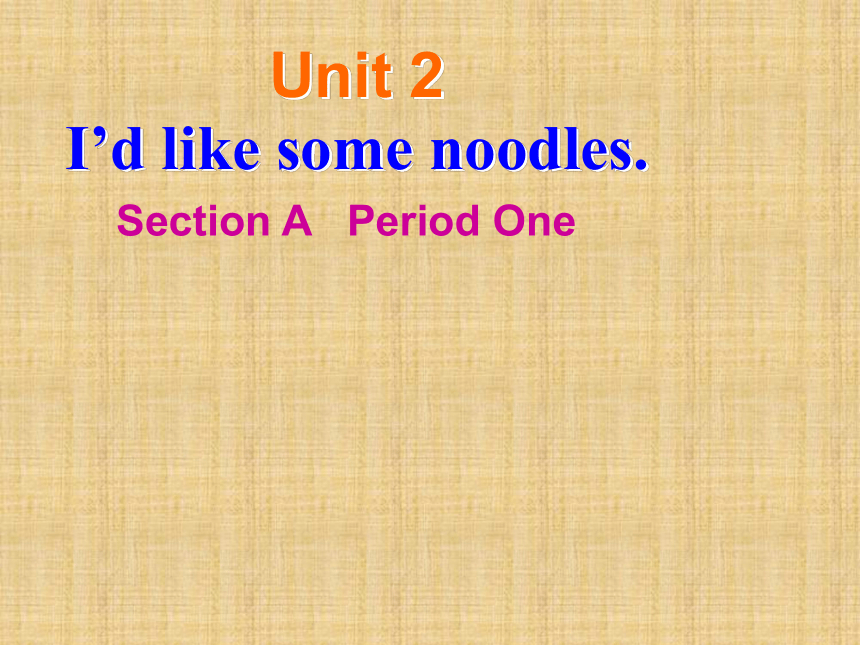
|
|
| 格式 | ppt | ||
| 文件大小 | 6.1MB | ||
| 资源类型 | 教案 | ||
| 版本资源 | 鲁教版 | ||
| 科目 | 英语 | ||
| 更新时间 | 2015-10-31 00:00:00 | ||
图片预览

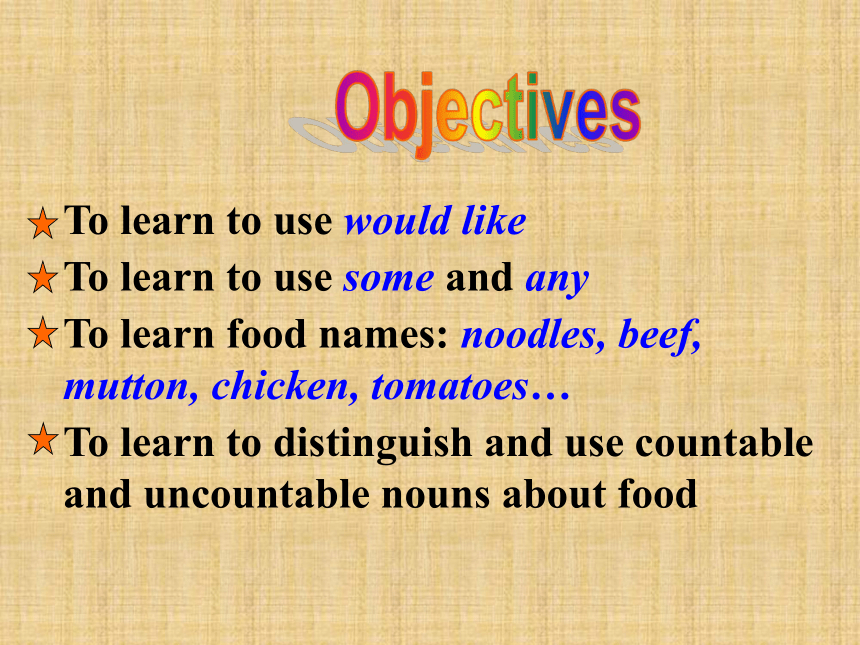
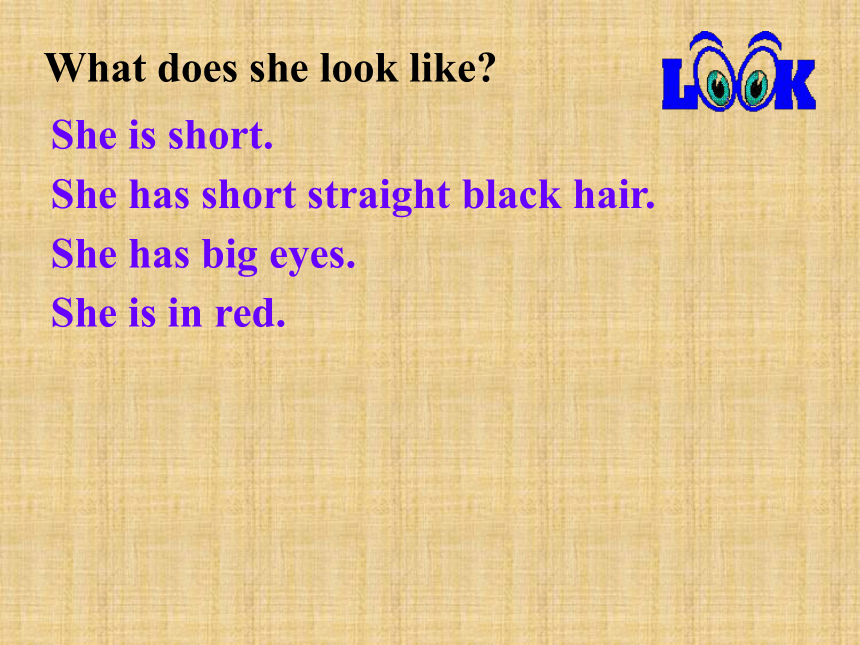
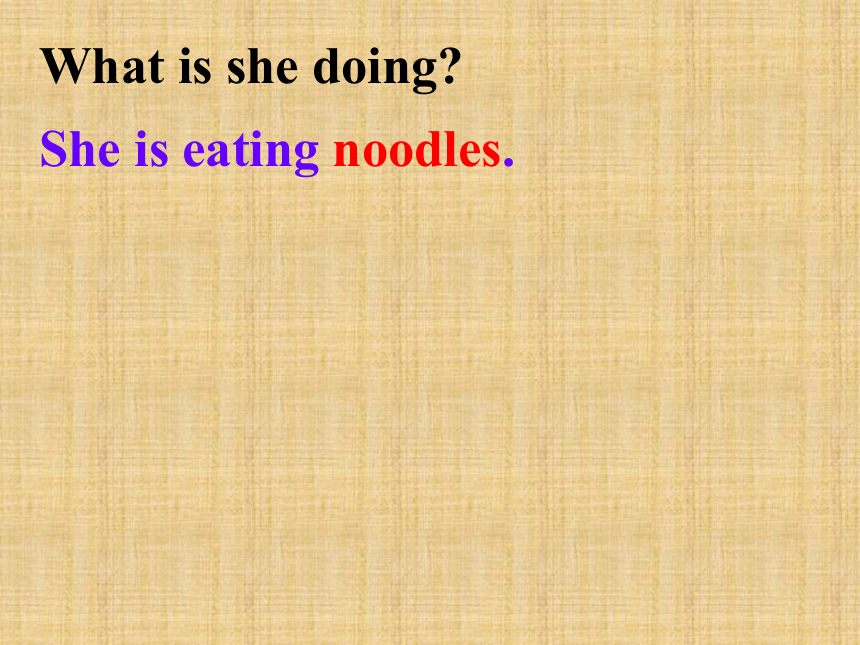
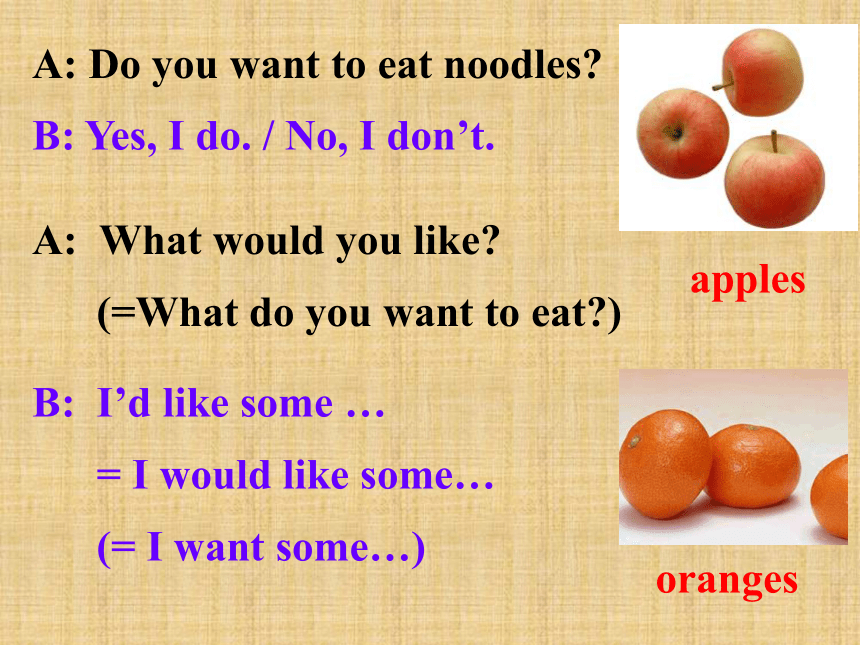
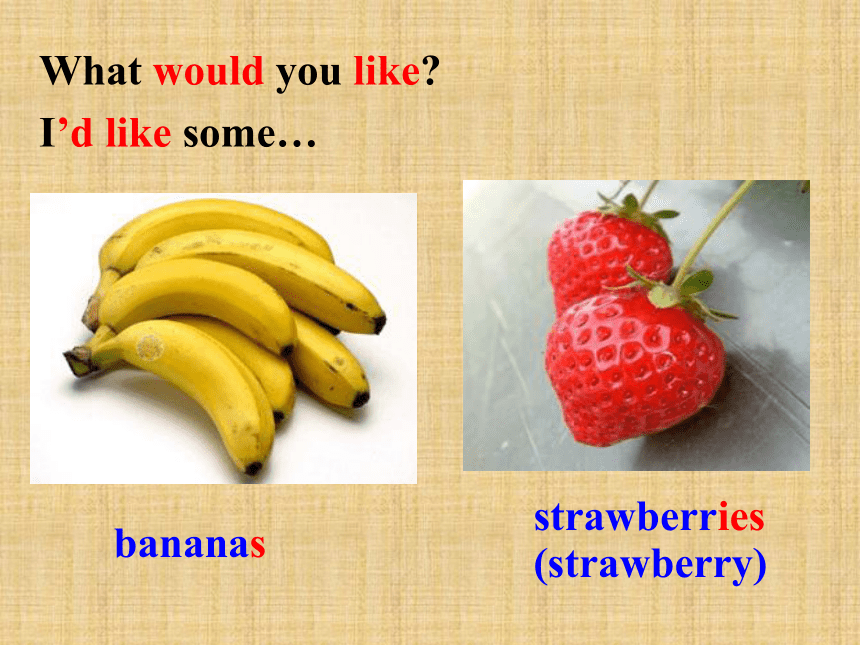
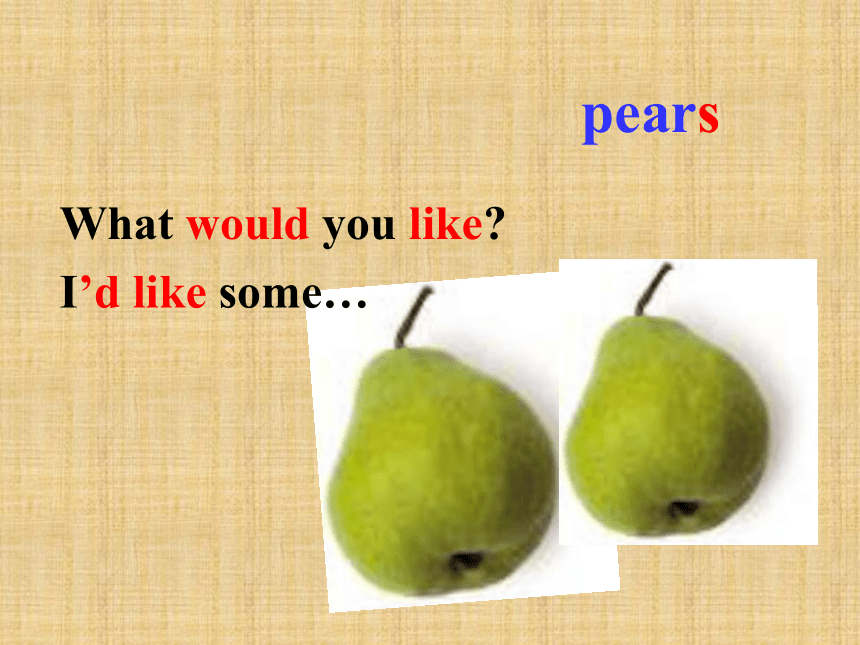
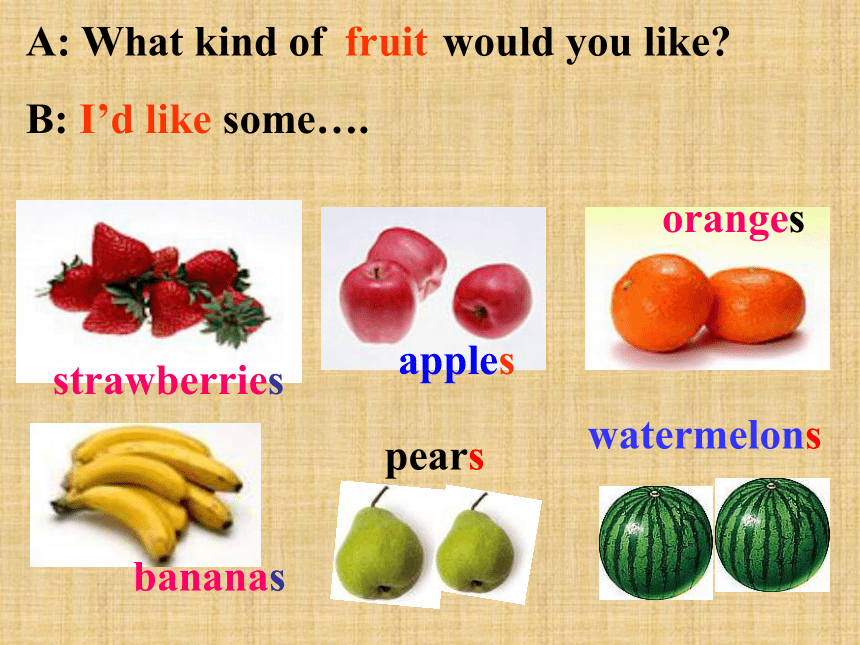
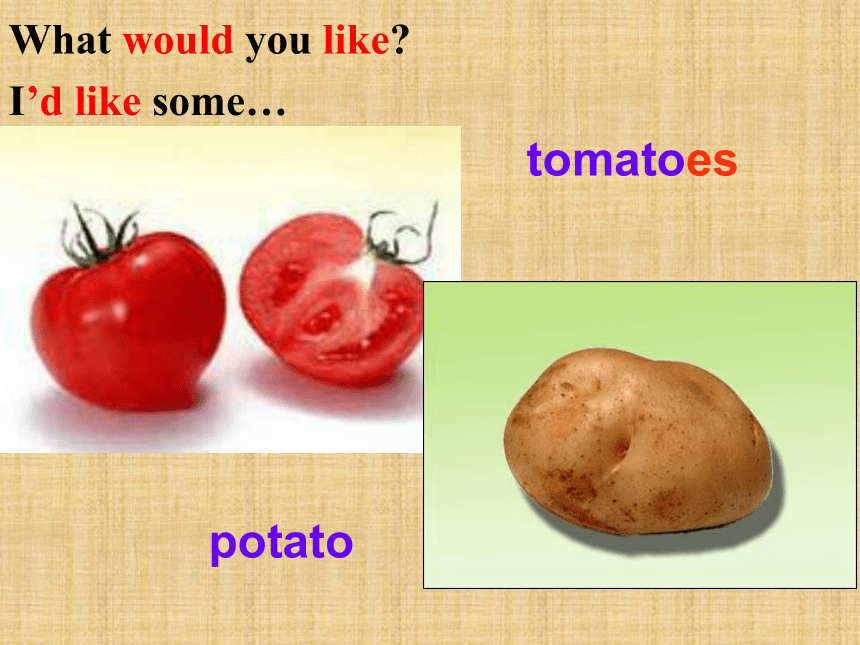
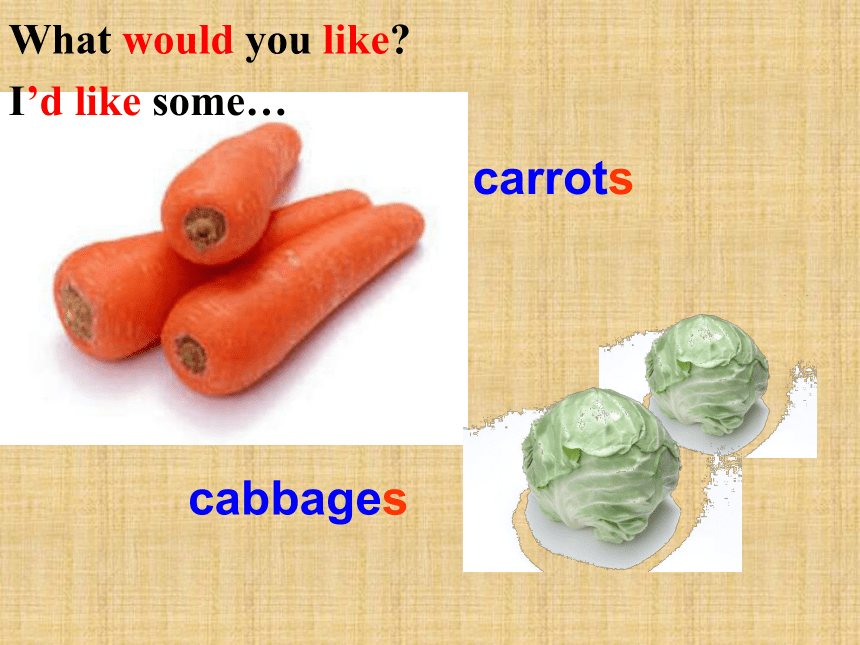
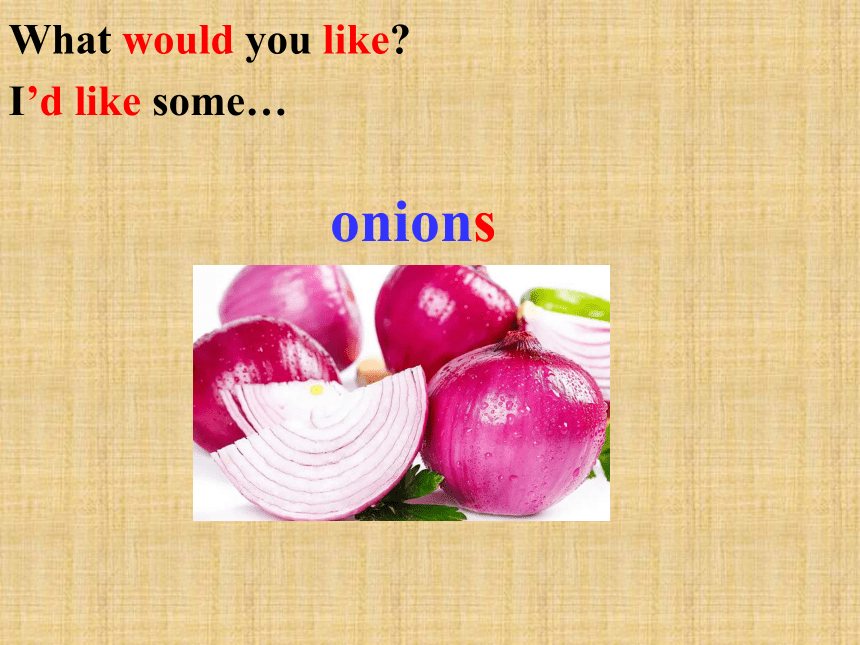
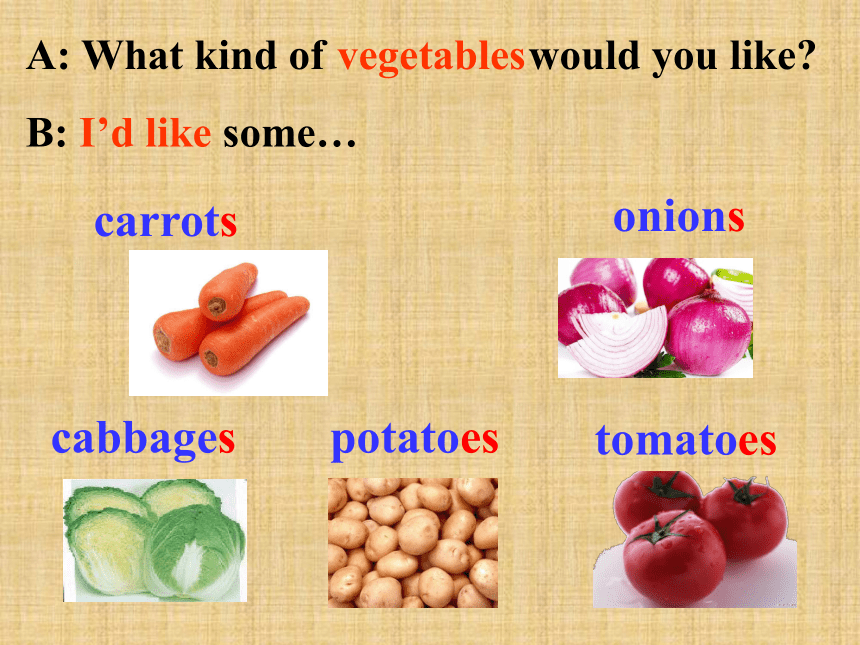
文档简介
(共61张PPT)
Unit 2
I’d like some noodles.
Section A Period One
To learn to use would like
To learn to use some and any
To learn food names: noodles, beef, mutton, chicken, tomatoes…
To learn to distinguish and use countable and uncountable nouns about food
What does she look like
She is short.
She has short straight black hair.
She has big eyes.
She is in red.
What is she doing
She is eating noodles.
A: What would you like
(=What do you want to eat )
B: I’d like some …
= I would like some…
(= I want some…)
A: Do you want to eat noodles
apples
oranges
B: Yes, I do. / No, I don’t.
bananas
strawberries
What would you like
I’d like some…
(strawberry)
pears
What would you like
I’d like some…
A: What kind of would you like
B: I’d like some….
fruit
strawberries
oranges
apples
pears
bananas
watermelons
tomatoes
potato
What would you like
I’d like some…
carrots
cabbages
What would you like
I’d like some…
onions
What would you like
I’d like some…
A: What kind of would you like
B: I’d like some…
vegetables
cabbages
potatoes
carrots
tomatoes
onions
beef
mutton
What would you like
I’d like some…
chicken
fish
What would you like
I’d like some…
pork
What would you / he / she like
I / He / She’d like some…
Are you hungry
Let’s go to the restaurant!
(特色菜)
special
What would you like
I’d like some________.
noodles
A: What kind of noodles
would you like
B: I’d like beef and
tomato noodles.
Special 1
A: What kind of noodles
would she like
B: She would like chicken and cabbage noodles.
Special 2
A: What kind of noodles
would they like
B: They would like mutton and potato noodles.
Special 3
What kind of noodles would you like
I’d like and noodles.
Group work
a small
a medium
a large
bowl of noodles
bowl of noodles
bowl of noodles
A: What size would you like
B: I’d like …
Pairwork
A: Can I help you
B: Yes, please. I’d like some noodles.
A: What kind of noodles would you like
B: I’d like …
A: What size would you like
B: I would like …
Match the words with the foods.
1. mutton ___
2. beef____
3. noodles____
4. chicken____
5. cabbage____
6. potatoes___
7. tomatoes___
8. carrots____
g
d
e
a
f
b
c
h
1a
___Special 1 ___Special 2 ___Special 3
√
Listen and check the noodles that the
person orders.
1b
Pair work
Practice the conversation in 1a with your partner. Then make your own conversations.
1c
1. ___noodles 2. ____beef
3. ___mutton 4. ____chicken
5. ___tomatoes 6. ____cabbage
7. ___potatoes 8. ____ vegetables
√
√
√
√
√
√
Listen and check the names of the foods your hear.
√
2a
Listen again. Complete the sentences.
Boy: 1. I’d like a _____ bowl of noodles.
2. I’d like ______, ______ and
_______ noodles, please.
Girl: 1. I’d like a _______ bowl.
2. I’d like ____ and ______
noodles, please.
chicken
potato
large
medium
beef
cabbage
tomato
2b
What kind of noodles would you like
I’d like beef noodles, please.
Pair work
Ask and answer questions in pairs. Use the information in 2a.
2c
Read the conversation in 2d and check their food.
2d
√
√
√
√
Fill in the blanks according to the dialogue in 2d.
Sally and Tom are in the restaurant. Sally _________ some _________ in the beef soup. She’d like _____________ of beef soup. Tom also like gongbao _______ and some mapo ______ with rice.
tomatoes
one large bowl
chicken
tofu
would like
Name Kind of noodles Size bowl
… beef and tomato large
1. Work in groups and ask:
What kind of noodles would you like What size would you like
2. Then make a report:
I’d like a small bowl of …noodles.
…would like a large bowl of … noodles… And …would like….
名词可分为可数名词和不可数名词。可数名词有单复数之分,前面可加数词或冠词。
Grammar focus
可数名词包括:
(1) 普通名词;
(2) 集体名词;
(3) 少数专有名词。
如: boy, book, family等都是可数名词。
普通名词是一类人或东西或是一个抽象概念的名称。如: boy, office, idea, book, mile等。
1. 普通名词受代词或所有格修饰时, 不
再加冠词。如: this (my, every, each,
John’s) book, our books。
2. 复数普通名词可用 many, few, a few, a
lot of 等修饰; 不用 much, little 等修
饰。
普通名词
集体名词
1. 集体名词是表示由若干个体组成的
集合体的名称。如:family, class,
police, cattle, jewelry 等。
2. 集体名词用 many, few, a few, a lot
of 等修饰, 不用 much, little修饰。
可数名词复数变化规则
1) 单数名词加s: students, apples,
bags, trees, books, brothers?
2) 以s、x、sh、ch结尾的名词加es:
glasses, boxes, brushes, matches?
3) 以辅音字母加y结尾的名词, 变y为i
加es: cities, babies, enemies
4) 以f或fe结尾的名词,多数变f为v加
es: wives, knives; 但有些词只加s:
roofs, proofs, chiefs?
5) 以o结尾的名词,有些加es: Negroes,
heroes, tomatoes, potatoes; 其它加s:
radios, zoos, pianos, photos.?
以o结尾的名词复数有的要加-es,有的
要加s, 一般来说无生命的名词变复数时
加-s, 有生命则加-es, 同学们不妨记住下
面两句话:
小马虎弹着钢琴(piano)听着收音机
(radio),又到动物园(zoo)照了张相
(photo),但考试得了个大鸡蛋(零分
zero),一律加s。
(2) 黑人(Negro)英雄(hero)爱吃土豆
(potato)西红柿(tomato),全部加es。
6) 不规则名词:
foot→ feet goose→ geese
tooth→ teeth child→ children
man→ men woman→ women
sheep→ sheep deer→ deer
mouse→ mice
7) 复合名词变复数: 以不可数名词结尾
的复合名词无复数形式,如:
homework
以man或woman为前缀的复合名词变
复数, 前后两个名词都变复数, 如:
man servant→ men servants,
woman student → women students
不可数名词
不可数名词主要包括两大类:物质名词与抽象名词。物质名词表示无法为个体的实物,如:食物、水、金属等,例如:rice, meat, bread, water, iron, steel, copper; 抽象名词为动作、状态、品质等无法计数的抽象概念,例如:advice, confidence, knowledge, shame, heat, darkness。
dumpling
dumplings
soup
soup
/fi /
fishes
/fi iz/
fish
fish
fish
种类
鱼肉
rice
rice
orange juice
orange juice
porridge
porridge
onion
onions
- What kind of noodles would you like
- I’d like beef noodles, please.
- What size would you like
I’d like a small/medium/large bowl,
please.
课时重点回顾
Is there any meat in the tomato and egg
soup
- No, there isn’t any./No, there’s no meat.
-Would you like a large bowl
-Yes, please.
课时重点回顾
Countable nouns:
bowls, apples, carrots, oranges,
strawberries
-Uncountable nouns:
beef, meat, milk, mutton, water
-Countable and uncountable nouns:
chicken, salad, ice-cream, cabbage
课时重点回顾
选择适当的单词完成句子。
would, special, noodles, large, size
1. What ______ bowl of soup does the
boy want
2. Would you like some beef ________
3. Oh, this T-shirt is too _____. It
doesn’t fit (适合) me.
4. This is the ________ in this restaurant.
It’s very delicious (美味的).
5. His father ________ like some mutton.
size
noodles
large
special
would
填入恰当的问句完成下列对话。
1. — ____________________________
— A medium bowl, please.
2. — ____________________________
— Yes, please. I like chicken.
3. — _____________________________
— She’d like to eat a hamburger.
4. — ________________________________
— I’d like tomato and egg noodles.
What size bowl would you like
Would you like some chicken
What would she like to eat
What kind of noodles would you like
Translate and write them down.
1. 我想要些面条。
2. - 你想要哪种面条?
- 请给我牛肉西红柿面条。
3. 牛肉面里头有蔬菜吗?
4. 西红柿鸡蛋汤里面有肉吗?
1. I’d like some noodles.
2. --- What kind of noodles would you
like
---Beef and tomato noodles, please.
3. Are there any vegetables in the beef noodles
4. Is there any meat in the tomato and egg soup
1. Would you like ____ hot soup
A. little B. much C. some D. any
2. –Would you like to come to dinner today
-I’d like to, ____ I’m too busy.
A. and B. so C. but D. as
3. Mario likes ____ cold hot dogs.
A. eat B. eating
C. ate D. is eating
Mutiple choice
4. I would like ___ in my noodles.
A. tomatoes and mutton
B. tomatoes and muttons
C. tomato and mutton
D. tomato and muttons
5. They would like ____ noodles.
A. tomatoes and mutton
B. tomatoes and muttons
C. tomato and mutton
D. tomato and muttons
6. —Would you like some _______
—No, thanks. I’m not hungry at all.
(2013浙江宁波)
water B. soup
C. orange D. bread
7. — I like reading.
—Me too. I especially like the written by J. K. Rowling. (2013浙江温州)
homework B. numbers
C. movies D. books
8. —What can I do for you
—Err, I want a glass of milk, some bread and_________. (2013湖南娄底)
A. some chickens B. any chickens C. some chicken
9. —Jenny, What’s your favorite .
—I like bananas best. (2013 湖南衡阳)
A. vegetables B. fruit
C. drink
10. —What kind of porridge would you like, Alice
---I would like ______. (2013广西贺州)
A. egg porridge B. eggs porridge
C. fish porridges D. fishes porridge
11. ——What would you like to drink, girls
——,________ please. (2013 湖北黄冈)
Two glass of water
B. Two glass of waters
C. Two cups of tea
D. Two cups of teas
To preview the new words and expressions
To preview the conversation in 3a
Unit 2
I’d like some noodles.
Section A Period One
To learn to use would like
To learn to use some and any
To learn food names: noodles, beef, mutton, chicken, tomatoes…
To learn to distinguish and use countable and uncountable nouns about food
What does she look like
She is short.
She has short straight black hair.
She has big eyes.
She is in red.
What is she doing
She is eating noodles.
A: What would you like
(=What do you want to eat )
B: I’d like some …
= I would like some…
(= I want some…)
A: Do you want to eat noodles
apples
oranges
B: Yes, I do. / No, I don’t.
bananas
strawberries
What would you like
I’d like some…
(strawberry)
pears
What would you like
I’d like some…
A: What kind of would you like
B: I’d like some….
fruit
strawberries
oranges
apples
pears
bananas
watermelons
tomatoes
potato
What would you like
I’d like some…
carrots
cabbages
What would you like
I’d like some…
onions
What would you like
I’d like some…
A: What kind of would you like
B: I’d like some…
vegetables
cabbages
potatoes
carrots
tomatoes
onions
beef
mutton
What would you like
I’d like some…
chicken
fish
What would you like
I’d like some…
pork
What would you / he / she like
I / He / She’d like some…
Are you hungry
Let’s go to the restaurant!
(特色菜)
special
What would you like
I’d like some________.
noodles
A: What kind of noodles
would you like
B: I’d like beef and
tomato noodles.
Special 1
A: What kind of noodles
would she like
B: She would like chicken and cabbage noodles.
Special 2
A: What kind of noodles
would they like
B: They would like mutton and potato noodles.
Special 3
What kind of noodles would you like
I’d like and noodles.
Group work
a small
a medium
a large
bowl of noodles
bowl of noodles
bowl of noodles
A: What size would you like
B: I’d like …
Pairwork
A: Can I help you
B: Yes, please. I’d like some noodles.
A: What kind of noodles would you like
B: I’d like …
A: What size would you like
B: I would like …
Match the words with the foods.
1. mutton ___
2. beef____
3. noodles____
4. chicken____
5. cabbage____
6. potatoes___
7. tomatoes___
8. carrots____
g
d
e
a
f
b
c
h
1a
___Special 1 ___Special 2 ___Special 3
√
Listen and check the noodles that the
person orders.
1b
Pair work
Practice the conversation in 1a with your partner. Then make your own conversations.
1c
1. ___noodles 2. ____beef
3. ___mutton 4. ____chicken
5. ___tomatoes 6. ____cabbage
7. ___potatoes 8. ____ vegetables
√
√
√
√
√
√
Listen and check the names of the foods your hear.
√
2a
Listen again. Complete the sentences.
Boy: 1. I’d like a _____ bowl of noodles.
2. I’d like ______, ______ and
_______ noodles, please.
Girl: 1. I’d like a _______ bowl.
2. I’d like ____ and ______
noodles, please.
chicken
potato
large
medium
beef
cabbage
tomato
2b
What kind of noodles would you like
I’d like beef noodles, please.
Pair work
Ask and answer questions in pairs. Use the information in 2a.
2c
Read the conversation in 2d and check their food.
2d
√
√
√
√
Fill in the blanks according to the dialogue in 2d.
Sally and Tom are in the restaurant. Sally _________ some _________ in the beef soup. She’d like _____________ of beef soup. Tom also like gongbao _______ and some mapo ______ with rice.
tomatoes
one large bowl
chicken
tofu
would like
Name Kind of noodles Size bowl
… beef and tomato large
1. Work in groups and ask:
What kind of noodles would you like What size would you like
2. Then make a report:
I’d like a small bowl of …noodles.
…would like a large bowl of … noodles… And …would like….
名词可分为可数名词和不可数名词。可数名词有单复数之分,前面可加数词或冠词。
Grammar focus
可数名词包括:
(1) 普通名词;
(2) 集体名词;
(3) 少数专有名词。
如: boy, book, family等都是可数名词。
普通名词是一类人或东西或是一个抽象概念的名称。如: boy, office, idea, book, mile等。
1. 普通名词受代词或所有格修饰时, 不
再加冠词。如: this (my, every, each,
John’s) book, our books。
2. 复数普通名词可用 many, few, a few, a
lot of 等修饰; 不用 much, little 等修
饰。
普通名词
集体名词
1. 集体名词是表示由若干个体组成的
集合体的名称。如:family, class,
police, cattle, jewelry 等。
2. 集体名词用 many, few, a few, a lot
of 等修饰, 不用 much, little修饰。
可数名词复数变化规则
1) 单数名词加s: students, apples,
bags, trees, books, brothers?
2) 以s、x、sh、ch结尾的名词加es:
glasses, boxes, brushes, matches?
3) 以辅音字母加y结尾的名词, 变y为i
加es: cities, babies, enemies
4) 以f或fe结尾的名词,多数变f为v加
es: wives, knives; 但有些词只加s:
roofs, proofs, chiefs?
5) 以o结尾的名词,有些加es: Negroes,
heroes, tomatoes, potatoes; 其它加s:
radios, zoos, pianos, photos.?
以o结尾的名词复数有的要加-es,有的
要加s, 一般来说无生命的名词变复数时
加-s, 有生命则加-es, 同学们不妨记住下
面两句话:
小马虎弹着钢琴(piano)听着收音机
(radio),又到动物园(zoo)照了张相
(photo),但考试得了个大鸡蛋(零分
zero),一律加s。
(2) 黑人(Negro)英雄(hero)爱吃土豆
(potato)西红柿(tomato),全部加es。
6) 不规则名词:
foot→ feet goose→ geese
tooth→ teeth child→ children
man→ men woman→ women
sheep→ sheep deer→ deer
mouse→ mice
7) 复合名词变复数: 以不可数名词结尾
的复合名词无复数形式,如:
homework
以man或woman为前缀的复合名词变
复数, 前后两个名词都变复数, 如:
man servant→ men servants,
woman student → women students
不可数名词
不可数名词主要包括两大类:物质名词与抽象名词。物质名词表示无法为个体的实物,如:食物、水、金属等,例如:rice, meat, bread, water, iron, steel, copper; 抽象名词为动作、状态、品质等无法计数的抽象概念,例如:advice, confidence, knowledge, shame, heat, darkness。
dumpling
dumplings
soup
soup
/fi /
fishes
/fi iz/
fish
fish
fish
种类
鱼肉
rice
rice
orange juice
orange juice
porridge
porridge
onion
onions
- What kind of noodles would you like
- I’d like beef noodles, please.
- What size would you like
I’d like a small/medium/large bowl,
please.
课时重点回顾
Is there any meat in the tomato and egg
soup
- No, there isn’t any./No, there’s no meat.
-Would you like a large bowl
-Yes, please.
课时重点回顾
Countable nouns:
bowls, apples, carrots, oranges,
strawberries
-Uncountable nouns:
beef, meat, milk, mutton, water
-Countable and uncountable nouns:
chicken, salad, ice-cream, cabbage
课时重点回顾
选择适当的单词完成句子。
would, special, noodles, large, size
1. What ______ bowl of soup does the
boy want
2. Would you like some beef ________
3. Oh, this T-shirt is too _____. It
doesn’t fit (适合) me.
4. This is the ________ in this restaurant.
It’s very delicious (美味的).
5. His father ________ like some mutton.
size
noodles
large
special
would
填入恰当的问句完成下列对话。
1. — ____________________________
— A medium bowl, please.
2. — ____________________________
— Yes, please. I like chicken.
3. — _____________________________
— She’d like to eat a hamburger.
4. — ________________________________
— I’d like tomato and egg noodles.
What size bowl would you like
Would you like some chicken
What would she like to eat
What kind of noodles would you like
Translate and write them down.
1. 我想要些面条。
2. - 你想要哪种面条?
- 请给我牛肉西红柿面条。
3. 牛肉面里头有蔬菜吗?
4. 西红柿鸡蛋汤里面有肉吗?
1. I’d like some noodles.
2. --- What kind of noodles would you
like
---Beef and tomato noodles, please.
3. Are there any vegetables in the beef noodles
4. Is there any meat in the tomato and egg soup
1. Would you like ____ hot soup
A. little B. much C. some D. any
2. –Would you like to come to dinner today
-I’d like to, ____ I’m too busy.
A. and B. so C. but D. as
3. Mario likes ____ cold hot dogs.
A. eat B. eating
C. ate D. is eating
Mutiple choice
4. I would like ___ in my noodles.
A. tomatoes and mutton
B. tomatoes and muttons
C. tomato and mutton
D. tomato and muttons
5. They would like ____ noodles.
A. tomatoes and mutton
B. tomatoes and muttons
C. tomato and mutton
D. tomato and muttons
6. —Would you like some _______
—No, thanks. I’m not hungry at all.
(2013浙江宁波)
water B. soup
C. orange D. bread
7. — I like reading.
—Me too. I especially like the written by J. K. Rowling. (2013浙江温州)
homework B. numbers
C. movies D. books
8. —What can I do for you
—Err, I want a glass of milk, some bread and_________. (2013湖南娄底)
A. some chickens B. any chickens C. some chicken
9. —Jenny, What’s your favorite .
—I like bananas best. (2013 湖南衡阳)
A. vegetables B. fruit
C. drink
10. —What kind of porridge would you like, Alice
---I would like ______. (2013广西贺州)
A. egg porridge B. eggs porridge
C. fish porridges D. fishes porridge
11. ——What would you like to drink, girls
——,________ please. (2013 湖北黄冈)
Two glass of water
B. Two glass of waters
C. Two cups of tea
D. Two cups of teas
To preview the new words and expressions
To preview the conversation in 3a
同课章节目录
- Unit 1 What does he look like?
- Section A
- Section B
- Unit 2 I'd like some noodles.
- Section A
- Section B
- Unit 3 How was your school trip?
- Section A
- Section B
- Unit 4 What did you do last weekend?
- Section A
- Section B
- Unit 5 Where did you go on vacation?
- Section A
- Section B
- Unit 6 How often do you exercise?
- Section A
- Section B
- Unit 7 I'm more outgoing than my sister.
- Section A
- Section B
- Unit 8 What's the best movie theater?
- Section A
- Section B
